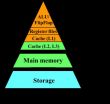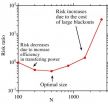(Press-News.org) WASHINGTON D.C., April 8, 2014 -- If a research team in Japan gets its wish, "normally off" computers may one day soon be replacing present computers in a move that would both eliminate volatile memory, which requires power to maintain stored data, and reduce the gigantic energy losses associated with it.
Most parts of present computers are made with volatile devices such as transistors and dynamic random access memory (DRAM), which loses information when powered off. So computers are designed on the premise that power is "normally on."
Back in 2000, the concept of "instant on" computers based on magnetoresistive random access memory (MRAM) emerged as a way to reduce that irritatingly long hang time associated with powering up – but it comes with a big tradeoff because it requires using volatile devices that continue to devour energy after the initial power up.
By 2001, researchers in Japan figured out a way to eliminate this pointless energy loss by using a nonvolatile function of advanced spin-transfer torque magnetoresistive random access memory (STT-MRAM) technology to create a new type of computer: a "normally off" one.
Now, Koji Ando and his colleagues at the Japanese National Projects have broadly envisioned the future of STT-MRAM, and in the Journal of Applied Physics, which is produced by AIP Publishing, they describe how it will radically alter computer architectures and consumer electronics.
"Spintronics couples magnetism with electronics at the quantum mechanical level," explained Ando. "Indeed, STT-MRAM no longer requires an electromagnetic coil for both writing and reading information. We're excited by this paradigm shift and are working on developing a variety of technologies for next-generation electronics devices."
The potential for redesigning present-day technologies so that computer power consumption is zero during any short intervals when users are absent is that may lead to extremely energy-efficient personal devices powered by a hand-crank or embedded solar panel. Such devices would find use in a wide swath of applications ranging from mobile computing to wearable or embedded electronics, and they would be of particular interest to the healthcare, safety and educational industries.
Some hurdles remain, Ando said. "We need high-performance nonvolatile devices that don't require a power supply to retain information to create 'normally off' computers while simultaneously guaranteeing sufficiently high-speed operation to manipulate information," Ando said. "The main memory, for example, requires performance as fast as 10 to 30 nanoseconds, and a density as high as 1 Gigabit per chip."
If STT-MRAM is to play a key role for "normally off" computers, it will first require the integration of a variety of technologies, he added. "We're currently collaborating with researchers in several fields – from materials science, device technology, circuit technology, memory and computer architectures, operating systems," Ando said.
INFORMATION:
The article, "Spin-transfer torque magnetoresistive random-access memory technologies for normally off computing" by K. Ando, S. Fujita, J. Ito, S. Yuasa, Y. Suzuki, Y. Nakatani, T. Miyazaki, and H. Yoda is published in the Journal of Applied Physics on April 8, 2014 (DOI: 10.1063/1.4869828). After that date, it can be accessed at: http://tinyurl.com/pjxvdu6
Authors on this study are affiliated with Japan's National Institute of Advanced Industrial Science and Technology, Toshiba Corp., Osaka University, University of Electro-Communication, and Tohoku University.
ABOUT THE JOURNAL
Journal of Applied Physics is an influential international journal publishing significant new experimental and theoretical results of applied physics research. See: http://jap.aip.org
Future computers that are 'normally off'
Spintronics-based technology, described in Journal of Applied Physics, may replace volatile memory and enable extremely energy-efficient, hand-cranked or solar-powered devices
2014-04-08
ELSE PRESS RELEASES FROM THIS DATE:
Is the power grid too big?
2014-04-08
WASHINGTON D.C., April 8, 2014 -- Some 90 years ago, British polymath J.B.S. Haldane proposed that for every animal there is an optimal size -- one which allows it to make best use of its environment and the physical laws that govern its activities, whether hiding, hunting, hoofing or hibernating. Today, three researchers are asking whether there is a "right" size for another type of huge beast: the U.S. power grid.
David Newman, a physicist at the University of Alaska, believes that smaller grids would reduce the likelihood of severe outages, such as the 2003 Northeast ...
Rice U. study: Creativity and innovation need to talk more
2014-04-08
HOUSTON – (April 8, 2014) – Creativity and innovation are not sufficiently integrated in either the business world or academic research, according to a new study by Rice University, the University of Edinburgh and Brunel University.
The findings are the result of the authors' review of the rapidly growing body of research into creativity and innovation in the workplace, with particular attention to the period from 2002 to 2013.
"There are many of us who study employee creativity and many of us who study innovation and idea implementation, but we don't talk to each ...
The surprising truth about obsessive-compulsive thinking
2014-04-08
Montreal, April 8, 2014 — People who check whether their hands are clean or imagine their house might be on fire are not alone. New research from Concordia University and 15 other universities worldwide shows that 94 per cent of people experience unwanted, intrusive thoughts, images and/or impulses.
The international study, which was co-authored by Concordia psychology professor Adam Radomsky and published in the Journal of Obsessive-Compulsive and Related Disorders, examined people on six continents.
Radomsky and his colleagues found that the thoughts, images and ...
Where credit is due: How acknowledging expertise can help conservation efforts
2014-04-08
Scientists know that tapping into local expertise is key to conservation efforts aimed at protecting biodiversity – but researchers rarely give credit to these local experts. Now some scientists are saying that's a problem, both for the local experts and for the science itself.
To address the problem, a group of scientists is calling for conservation researchers to do a better job of publicly acknowledging the role of local experts and other non-scientists in conservation biology.
"For example, in the rainforests of the Yucatán, scientists couldn't even begin to do ...
Blocking DNA repair mechanisms could improve radiation therapy for deadly brain cancer
2014-04-08
DALLAS – April 8, 2014 – UT Southwestern Medical Center researchers have demonstrated in both cancer cell lines and in mice that blocking critical DNA repair mechanisms could improve the effectiveness of radiation therapy for highly fatal brain tumors called glioblastomas.
Radiation therapy causes double-strand breaks in DNA that must be repaired for tumors to keep growing. Scientists have long theorized that if they could find a way to block repairs from being made, they could prevent tumors from growing or at least slow down the growth, thereby extending patients' survival. ...
What songbirds tell us about how we learn
2014-04-08
This news release is available in French. When you throw a wild pitch or sing a flat note, it could be that your basal ganglia made you do it. This area in the middle of the brain is involved in motor control and learning. And one reason for that errant toss or off-key note may be that your brain prompted you to vary your behavior to help you learn, from trial-and-error, to perform better.
But how does the brain do this, how does it cause you to vary your behavior?
Along with researchers from the University of California, San Francisco, Indian Institute of Science ...
NASA satellite sees Tropical Depression Peipah approaching Philippines
2014-04-08
As Tropical Depression Peipah continues moving toward the central Philippines, NASA's Aqua satellite passed overhead and took an infrared look at the cloud top temperatures for clues about its strength.
On April 8 at 05:11 UTC/1:11 a.m. EDT/11 p.m. Manila local time, the Atmospheric Infrared Sounder instrument known as AIRS gathered infrared data on Tropical Depression Peipah. AIRS is one of the instruments that flies aboard NASA's Aqua satellite. The AIRS data showed thunderstorms with very cold cloud-top temperatures surrounded the center of the low-level circulation ...
Intranasal ketamine confers rapid antidepressant effect in depression
2014-04-08
A research team from the Icahn School of Medicine at Mount Sinai published the first controlled evidence showing that an intranasal ketamine spray conferred an unusually rapid antidepressant effect –within 24 hours—and was well tolerated in patients with treatment-resistant major depressive disorder. This is the first study to show benefits with an intranasal formulation of ketamine. Results from the study were published online in the peer-reviewed journal Biological Psychiatry on April 2, 2014.
Of 18 patients completing two treatment days with ketamine or saline, eight ...
DNA modifications measured in blood signal related changes in the brain
2014-04-08
Johns Hopkins researchers say they have confirmed suspicions that DNA modifications found in the blood of mice exposed to high levels of stress hormone — and showing signs of anxiety — are directly related to changes found in their brain tissues.
The proof-of-concept study, reported online ahead of print in the June issue of Psychoneuroendocrinology, offers what the research team calls the first evidence that epigenetic changes that alter the way genes function without changing their underlying DNA sequence — and are detectable in blood — mirror alterations in brain tissue ...
New methodology to find out about yeast changes during wine fermentation
2014-04-08
This knowledge is of particular interest for producers, since changes in the grape directly affect the chemical composition of the must.
The thesis entitled "Estudios avanzados de la fisiología de levadura en condiciones de vinificación. Bases para el desarrollo de un modelo predictivo" [Advanced studies into yeast physiology in vinification conditions. Bases for developing a forecasting model] is part of the Demeter project. This project seeks to study and find out the effects of climate change on viticultural and oenological activities, and to come up with new strategies ...
LAST 30 PRESS RELEASES:
Novel camel antimicrobial peptides show promise against drug-resistant bacteria
Scientists discover why we know when to stop scratching an itch
A hidden reason inner ear cells die – and what it means for preventing hearing loss
Researchers discover how tuberculosis bacteria use a “stealth” mechanism to evade the immune system
New microscopy technique lets scientists see cells in unprecedented detail and color
Sometimes less is more: Scientists rethink how to pack medicine into tiny delivery capsules
Scientists build low-cost microscope to study living cells in zero gravity
The Biophysical Journal names Denis V. Titov the 2025 Paper of the Year-Early Career Investigator awardee
Scientists show how your body senses cold—and why menthol feels cool
Scientists deliver new molecule for getting DNA into cells
Study reveals insights about brain regions linked to OCD, informing potential treatments
Does ocean saltiness influence El Niño?
2026 Young Investigators: ONR celebrates new talent tackling warfighter challenges
Genetics help explain who gets the ‘telltale tingle’ from music, art and literature
Many Americans misunderstand medical aid in dying laws
Researchers publish landmark infectious disease study in ‘Science’
New NSF award supports innovative role-playing game approach to strengthening research security in academia
Kumar named to ACMA Emerging Leaders Program for 2026
AI language models could transform aquatic environmental risk assessment
New isotope tools reveal hidden pathways reshaping the global nitrogen cycle
Study reveals how antibiotic structure controls removal from water using biochar
Why chronic pain lasts longer in women: Immune cells offer clues
Toxic exposure creates epigenetic disease risk over 20 generations
More time spent on social media linked to steroid use intentions among boys and men
New study suggests a “kick it while it’s down” approach to cancer treatment could improve cure rates
Milken Institute, Ann Theodore Foundation launch new grant to support clinical trial for potential sarcoidosis treatment
New strategies boost effectiveness of CAR-NK therapy against cancer
Study: Adolescent cannabis use linked to doubling risk of psychotic and bipolar disorders
Invisible harms: drug-related deaths spike after hurricanes and tropical storms
Adolescent cannabis use and risk of psychotic, bipolar, depressive, and anxiety disorders
[Press-News.org] Future computers that are 'normally off'Spintronics-based technology, described in Journal of Applied Physics, may replace volatile memory and enable extremely energy-efficient, hand-cranked or solar-powered devices





